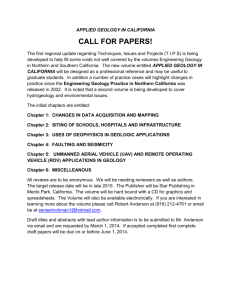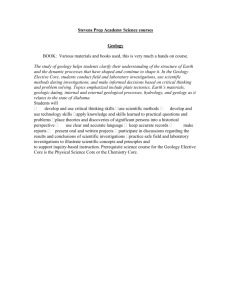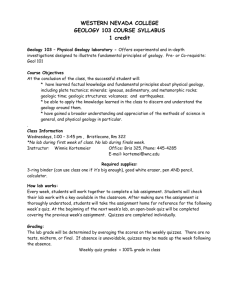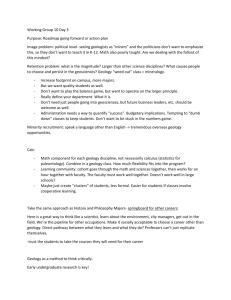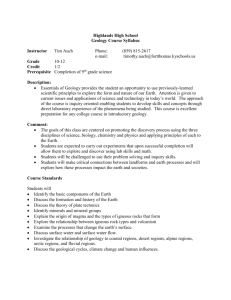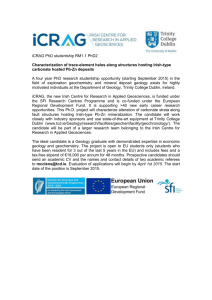Active-Learning Classrooms
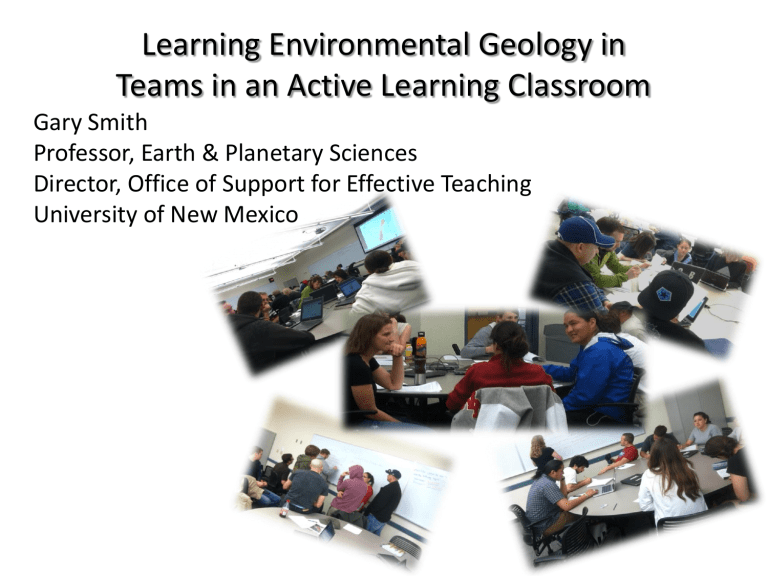
Learning Environmental Geology in
Teams in an Active Learning Classroom
Gary Smith
Professor, Earth & Planetary Sciences
Director, Office of Support for Effective Teaching
University of New Mexico
Wisdom from a UNM Student
“Don’t re-teach yourself. Standing at the front of the room talking and writing on the board is you re-enforcing what you know.
Engage your students… we need to work with the material, talk about it, think about it, not listen to you all of the time.”
UNM student panelist, “Improving
Native American Student Success”
Active learning includes any class activity that
“involves students in doing things and thinking about the things they are doing”
(Bonwell and Eison, 1991, Active learning: creating excitement in the classroom )
Students learn best when they take an active role:
•When they discuss what they are reading
•When they practice what they are learning
•When they apply practices and ideas.
Can active learning take place in the traditional college classroom?
Can active learning take place in the traditional college classroom?
Yes, but it’s not ideal…
Instead… Learning Studio Classrooms
Student-Centered Active
Learning Environment for
Undergraduate Programs
(SCALE UP; NCSU)
Active-Learning Classrooms
(ALC; U Minn)
Technology Enabled
Active Learning
(TEAL, MIT)
Spaces to Transform,
Interact, Learn, Engage
(TILE, U Iowa)
UNM is adding Learning Studio Classrooms
54 student capacity (Dane Smith Hall 224; opened Jan. 2012)
126-seat and 63-seat classrooms opening in Fall 2013
48-seat classroom in Dept. of Earth & Planetary Science opening in Fall 2013
3, 3-person teams per table
An Example Course – Environmental Geology – EPS 333
What will we learn in Environmental Geology?
You will be able to:
• Obtain/compile, illustrate, and interpret relevant data to determine direction and rate of ground-water flow, and transport of ground-water contaminants.
• Explain and predict the effects of ground-water withdrawal on water levels and on ground-water flow.
• Distinguish between natural and anthropogenic controls on stream discharge and explain interactions between surface water and ground water.
What will we learn in Environmental Geology?
You will be able to:
Explain some of the geologic processes that determine the origin, economic value, and environmentally sound extraction of earth resources.
What will we learn in Environmental Geology?
You will be able to:
• Use geologic information to determine spatially varying risk of damage and fatalities due to earthquakes, volcanic eruptions, and river flooding.
• Use basic probability to assess geologic-hazard risk.
What will we learn in Environmental Geology?
You will be able to:
• Distinguish a testable scientific hypothesis or data-supported interpretation from an opinion.
• Use data to compose scientific interpretations/conclusions.
• Explain the scientific aspects of a problem to nonscientists in a fashion that enhances understanding and decisionmaking.
• Explain the geologic background behind headline environmental geology issues affecting New
Mexicans
• Write concise, comprehendible, and scientifically defendable interpretations.
What will we learn in Environmental Geology?
• Acquire skills in working with others as a member of a team
Positive interdependency • Individual accountability
Individual
Team
Table team
Who are the Students?
Geography • Humanities
Education • Anthropology
Planning • Journalism
Political Science
Economics • Psychology
Earth &
Planetary
Sciences
Earth & Planet. Sci.
•
Environ. Sci.
•
Biology
Engin./Comp.Sci.
• chemistry
51 % have completed writing courses beyond freshman comp.
• 11 % have completed hydrology, environmental systems, aqueous geochemistry, geochemistry
59% EPS and
ENVS minors
Environmental
Science
InClass Concept Assignments focus on problem-solving in teams
Power-up laptops;
Login to Learn for InClass 12
InClass Concept Assignments focus on problem-solving in teams
Brainstorming sessions engage table teams and the entire class
Brainstorming sessions engage table teams and the entire class
“Inquisitive spies”
“Jigsaw” research / writing / discussion engages peer learning and teaching across the class
“Jigsaw” research / writing / discussion engages peer learning and teaching across the class
Authentic research project engages each team as a consulting firm to provide multiple, sequential deliverables
Authentic research project engages each team as a consulting firm to provide multiple, sequential deliverables
Building communities that support learning in the classroom
